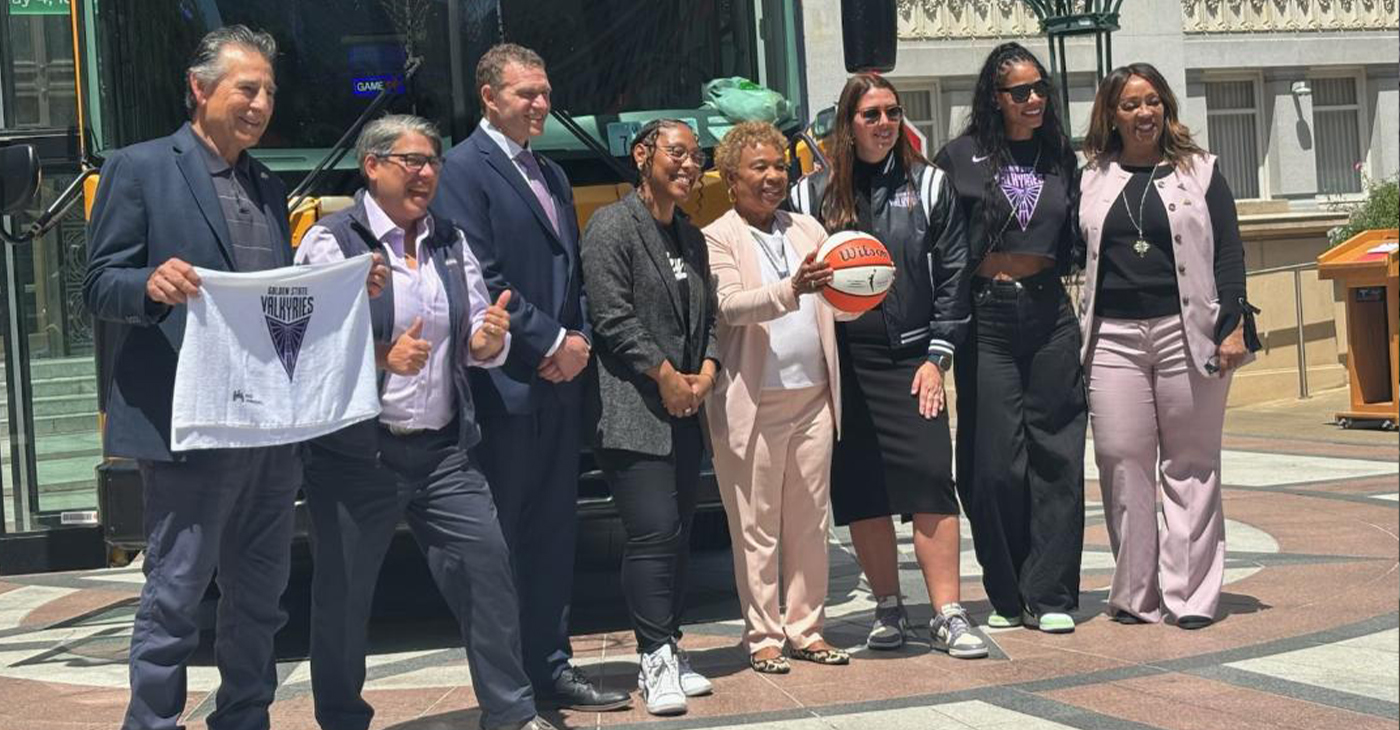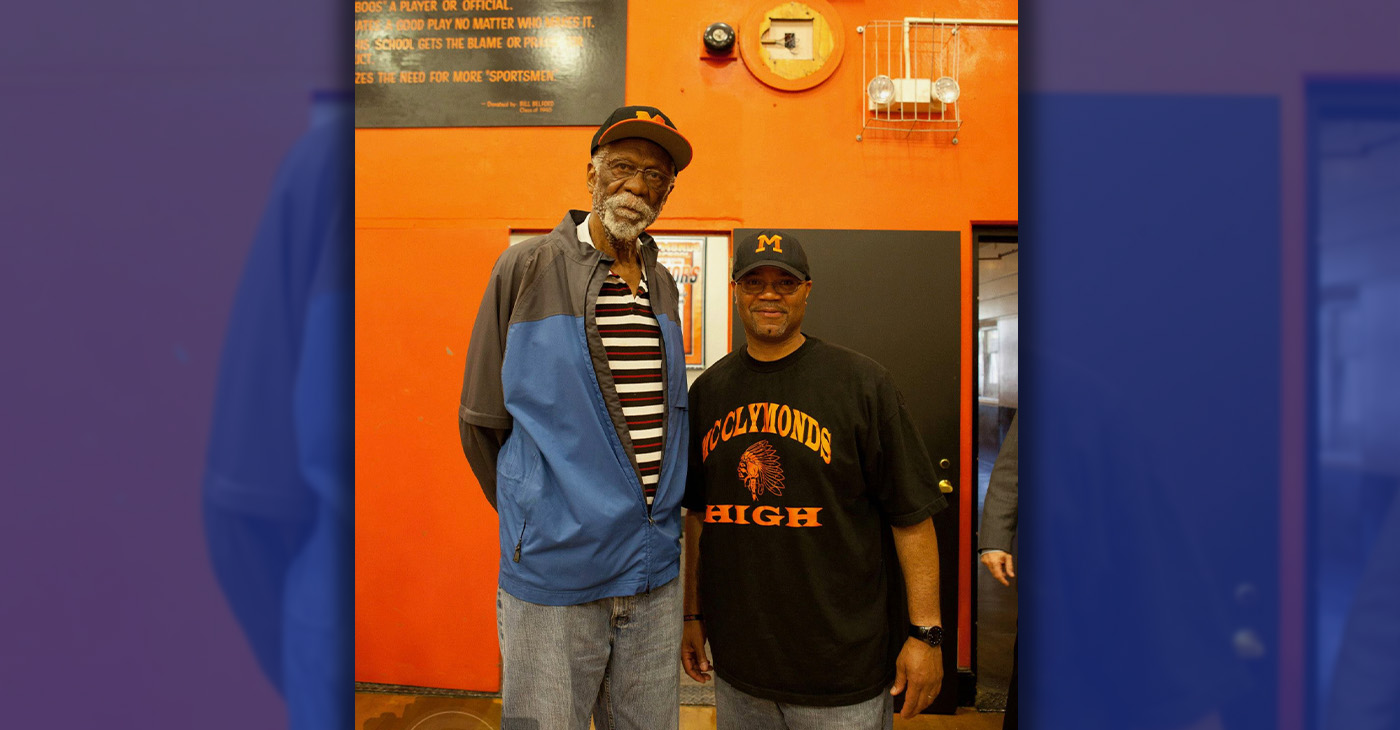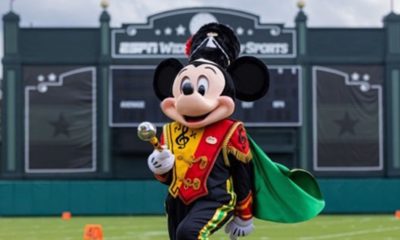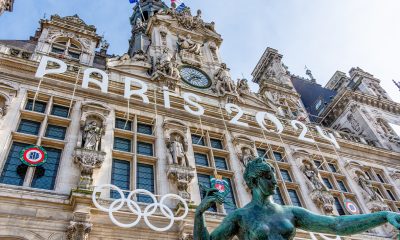Sports
12 Schemes Outlined by Prosecutors in Soccer Indictment

This is a combo of six file photos of the soccer officials involved in the US Justice Department of investigation into corruption at FIFA. From top left clockwise: Jeffrey Webb, current FIFA vice-president and executive committee member, Concacaf president; Jose Maria Marin, current member of the FIFA organising committee for the Olympic football tournaments; Nicolas Leoz, former FIFA executive committee member and Conmebol president; Eugenio Figueredo current FIFA vice-president and executive committee member; Jack Warner, former FIFA vice-president and executive committee member, Concacaf president; and Eduardo Li, current FIFA executive committee member-elect, Concacaf executive committee member. (AP Photo/File)
The Associated Press
The indictment of soccer officials and marketing and TV executives Wednesday alleges 12 schemes:
SCHEME A — 1993, 1995 AND 1997 COPA AMERICAS
Traffic Brazil purchased rights for the three tournaments in a deal worth $6.6 million. Nicolas Leoz of Paraguay, then president of the South American governing body CONMEBOL and later a FIFA executive committee member, refused to sign the contract until he received a dollar payment in six figures. In 1993 and 1995, Leoz demanded additional payments starting in 1993 or 1995 for future Copa America tournaments, and payments increased over time to seven figures. In 2007, the year Venezuela hosted the tournament, the country’s soccer federation president, Rafael Esquivel, demanded and received $1 million and $700,000 payments from Traffic.
SCHEME B — CONCACAF GOLD CUP
Traffic Sports USA caused hundreds of thousands in payments to be made to Jack Warner, then president of the Confederation of North, Central America and Caribbean Association Football (CONCACAF), and co-conspirator No. 1, whose description matches that of then-CONCACAF General Secretary Chuck Blazer.
SCHEME C — COPA LIBERTADORES
Starting around the early 2000s, Leoz asked for payments from a sports marketing company and for diversion of payments slated to go to CONMEBOL in exchange for support of that company in a marketing deal. Leoz asked in February and May 2006 for more than $2 million owed to CONMEBOL by an affiliate of that company to be sent to Leoz’s accounts in Paraguay and Switzerland. Leoz asked for additional payments around 2008.
SCHEME D — COPA DO BRAZIL
Jose Maria Marin, then president of Brazilian soccer’s governing body, requested bribe payments in 2012 as part of Traffic Brazil and an unidentified sports marketing company’s contract for the Copa do Brazil for 2013-22. The bribe payments, which totaled 2 million reals (approximately $986,000), were split among Marin and two unidentified people.
SCHEME E — BRAZILIAN FEDERATION EQUIPMENT SUPPLIER
The Confederacao Brasileira de Desportos, the governing body of Brazilian soccer, announced a 10-year sponsorship and endorsement agreement with Nike in 1996 that made the company the exclusive jersey and equipment supplier to the federation, including the national team. Nike’s deal called for it to pay the CBF $160 million, of which the CBF gave a percentage to Traffic Brazil. Nike then agreed to pay a Traffic affiliate with a Swiss bank account an additional $40 million.
SCHEME F — 2002, 2006, 2010 and 2014 World Cup QUALIFIERS IN THE CARIBBREAN
Warner was also president of the Caribbean Football Union and a special adviser to the Trinidad and Tobago Football Federation. Traffic USA bought rights to Caribbean home World Cup qualifiers from CFU, then bought the rights to Trinidad’s home qualifiers, which it already owned, from the TTFA. Traffic USA then diverted payments to a Warner-controlled account. In one of the examples, for 2006 World Cup qualifiers, Traffic USA paid the CFU $900,000, then agreed to pay the TTFA $800,000 for rights it already owned and wired the money to an account in Trinidad and Tobago that Warner controlled. For the 2010 World Cup, Traffic USA paid the CFU $2.2 million, then paid Warner-controlled accounts $800,000 for the same rights.
SCHEME G — 2010 WORLD CUP VOTES
In the early 2000s, Warner directed co-conspirator No. 14, identified as a member of his family, to pick up a briefcase with “bundles of U.S. currency in $10,000 stacks in a hotel room” from co-conspirator No. 15, identified as a high-ranking South African bid committee official. Before the vote for 2010 host, Warner traveled to Morocco and was offered a $1 million payment by a representative of its bid committee in exchange for his vote. Before the vote, co-conspirator No. 1 (who appears to be Blazer) understood a proposed $10 million payment was to be made to the CFU for the votes of himself, Warner and co-conspirator No. 17. South Africa was voted the 2010 host in May 2004. In January and March of 2008, $10 million in payments were made from a FIFA account in Switzerland to a Bank of America account in New York for credit to an account in the names of CFU and CONCACAF and controlled by Warner at Republic Bank in Trinidad and Tobago. In the following three years, Warner made three payments to co-conspirator No. 1 totaling $750,000.
SCHEME H — CENTRAL AMERICAN WORLD CUP QUALIFIERS
Eduardo Li, then president of Costa Rican soccer’s governing body, in 2009 asked for a six-figure bribe from Traffic USA as part of an agreement for rights for Costa Rica’s home qualifiers for the 2018 World Cup, a deal worth $2.55 million to $3 million, depending on the team’s success. The request was made to co-conspirator No. 4, whose description matches that of Enrique Sanz, who was a Traffic USA vice president before becoming CONCACAF general secretary in July 2012. Julio Rocha, then president of Nicaraguan soccer’s governing body and later a FIFA development officer, around 2011 also asked for a six-figure bribe from Traffic USA as part of an agreement for rights for Nicaragua’s home qualifiers for the 2018 World Cup, a deal worth $1,138,000 to $1,288,000, depending on the team’s success. During the time co-conspirator No. 4 negotiated on behalf of Traffic USA, bribes were paid to at least two other Central American soccer federation presidents.
SCHEME I — 2011 ELECTION FOR FIFA PRESIDENT
At a meeting in Trinidad and Tobago in May 2011 arranged by Warner, CFU staff gave officials envelopes each containing $40,000 and told them the money came from co-conspirator No. 7, whose description matches that of Mohamed bin Hammam at Qatar, then president of the Asian Football Confederation. At the time, bin Hammam was running for FIFA president in opposition to Sepp Blatter, who has served as president since 1998. After the payments became public and Warner resigned his soccer positions, on July 14, 2011 co-conspirator No. 7 caused $1,211,980 to be wired from an account he controlled in Qatar to a Citibank account for credit to Warner’s account at Intercommercial Bank in Trinidad and Tobago.
SCHEME J — CARIBBEAN WORLD CUP QUALIFIERS 2
Costas Takkas, an associate of Cayman Islands soccer federation president Jeffrey Webb, solicited a $3 million bribe from Traffic USA as part of a $23 million CFU deal for rights to Caribbean qualifiers for 2018 and 2022 World Cups. Webb had been elected CONCACAF president in May 2012. Co-conspirator No. 4 (who appears to be Sanz) participated in negotiations, and payments were made through entities controlled by Takkas. Some of the payments were transferred to United Community Bank in Blairsville, Georgia, in the account of a contractor who was building a swimming pool at Webb’s residence in Loganville, Georgia.
SCHEME K — CONCACAF GOLD CUP AND CHAMPIONS LEAGUE
Co-conspirator No. 4 (who appears to be Sanz) negotiated a $15.5 million deal on behalf of CONCACAF with Traffic USA in November 2012 for rights to the 2013 Gold Cup and 2013-14 and 2014-15 Champions Leagues. Co-conspirator No. 4 solicited a $1.1 million bribe that was agreed to by Aaron Davidson, an executive of Traffic Sports USA, and co-conspirator No. 2, the founder of Brazil-based Traffic Group. CONCACAF and Traffic USA agreed on Nov. 15, 2013, to a $60 million deal for the 2015, 2017, 2019 and 2021 Gold Cups, and six seasons of Champions Leagues through 2021-22. The parties agreed to a $2 million bribe for Webb.
SCHEME L — COPA AMERICA CENTENARIO
Prosecutors said CONMEBOL reached an agreement in 2013 with a new company, Datisa, on a $240 million contract for rights to the Copa America in 2015, 2019 and 2023, and the following year to a $112.5 million deal for the 2016 Copa America Centenario in the U.S. As part of the deals, prosecutors said Datisa agreed to pay $110 million in bribes to South American soccer officials.
Copyright 2015 The Associated Press. All rights reserved. This material may not be published, broadcast, rewritten or redistributed.
Alameda County
Seth Curry Makes Impressive Debut with the Golden State Warriors
Seth looked comfortable in his new uniform, seamlessly fitting into the Warriors’ offensive and defensive system. He finished the night with an impressive 14 points, becoming one of the team’s top scorers for the game. Seth’s points came in a variety of ways – floaters, spot-up three-pointers, mid-range jumpers, and a handful of aggressive drives that kept the Oklahoma City Thunder defense on its heels.

By Y’Anad Burrell
Tuesday night was anything but ordinary for fans in San Francisco as Seth Curry made his highly anticipated debut as a new member of the Golden State Warriors. Seth didn’t disappoint, delivering a performance that not only showcased his scoring ability but also demonstrated his added value to the team.
At 35, the 12-year NBA veteran on Monday signed a contract to play with the Warriors for the rest of the season.
Seth looked comfortable in his new uniform, seamlessly fitting into the Warriors’ offensive and defensive system. He finished the night with an impressive 14 points, becoming one of the team’s top scorers for the game. Seth’s points came in a variety of ways – floaters, spot-up three-pointers, mid-range jumpers, and a handful of aggressive drives that kept the Oklahoma City Thunder defense on its heels.
One of the most memorable moments of the evening came before Seth even scored his first points. As he checked into the game, the Chase Center erupted into applause, with fans rising to their feet to give the newest Warrior a standing ovation.
The crowd’s reaction was a testament not only to Seth’s reputation as a sharpshooter but also to the excitement he brings to the Warriors. It was clear that fans quickly embraced Seth as one of their own, eager to see what he could bring to the team’s championship aspirations.
Warriors’ superstar Steph Curry – Seth’s brother – did not play due to an injury. One could only imagine what it would be like if the Curry brothers were on the court together. Magic in the making.
Seth’s debut proved to be a turning point for the Warriors. Not only did he contribute on the scoreboard, but he also brought a sense of confidence and composure to the floor.
While their loss last night, OKC 124 – GSW 112, Seth’s impact was a game-changer and there’s more yet to come. Beyond statistics, it was clear that Seth’s presence elevated the team’s performance, giving the Warriors a new force as they look to make a deep playoff run.
Barbara Lee
WNBA’s Golden State Valkyries Kick Off Season with Community Programs in Oakland
“The Golden State Valkyries are more than a team—they’re a movement,” said Oakland Interim-Mayor Kevin Jenkins. “Their touchdown in Oakland marks a new era of opportunity, inspiration, and equity in sports. This partnership reflects our city’s deep commitment to uplifting women, investing in youth, and building a community where every dream has a place to grow. We’re proud to welcome the Valkyries to The Town.”

Team installs new nets at playgrounds, holds flag-raisings at City Halls in Oakland and S.F.
Special to The Post
The Golden State Valkyries brought the excitement of their inaugural season to every corner of the Bay Area with a full slate of community celebrations leading up to their historic home-opener against the Los Angeles Sparks at the Chase Center in San Francisco on Friday.
The week featured flag-raising ceremonies at city halls in Oakland and San Francisco, three “Violet Net” installation days at Oakland parks to encourage basketball play, fun “Hoopbus” takeovers at multiple schools presented by Kaiser Permanente, and player appearances.
“The Golden State Valkyries are more than a team—they’re a movement,” said Oakland Interim-Mayor Kevin Jenkins. “Their touchdown in Oakland marks a new era of opportunity, inspiration, and equity in sports. This partnership reflects our city’s deep commitment to uplifting women, investing in youth, and building a community where every dream has a place to grow. We’re proud to welcome the Valkyries to The Town.”
In total, 90 violet nets were installed on 45 basketball courts across 34 public parks throughout Oakland this week. A list of the parks receiving violet nets can be found at Valkyries.com.
About the Golden State Valkyries
The Golden State Valkyries, the WNBA affiliate of the seven-time NBA Champion Golden State Warriors, were announced as the 13th WNBA franchise on Oct. 5, 2023. According to Norse mythology, Valkyries are a host of warrior women who are fearless and unwavering – flying through air and sea alike.
This brand is Golden State’s modern interpretation of Valkyries: strong, bold, and fierce. Tipping off during the 2025 WNBA season, the team is headquartered in Oakland and will play home games at Chase Center in San Francisco. For Golden State Valkyries’ assets, including team logos, visit valkyries.com.
Activism
McClymonds High Names School Gym for Star Graduate, Basketball Legend Bill Russell
William “Bill” Felton Russell was born on Feb. 12, 1934, and died on July 31, 2022. He achieved fame as a U.S. professional basketball player who played center for the Boston Celtics of the National Basketball Association (NBA) from 1956 to 1969. He was the centerpiece of the Celtics dynasty that won 11 NBA championships during his 13-year career.

By Ken Epstein
West Oakland’s McClymonds High School, “the School of Champions,” this week named the school’s gymnasium in honor of one of its most famous graduates, basketball legend Bill Russell (class of ’52).
William “Bill” Felton Russell was born on Feb. 12, 1934, and died on July 31, 2022. He achieved fame as a U.S. professional basketball player who played center for the Boston Celtics of the National Basketball Association (NBA) from 1956 to 1969. He was the centerpiece of the Celtics dynasty that won 11 NBA championships during his 13-year career.
Russell is widely known as one of the greatest basketball players of all time. In 2011, he received the Presidential Medal of Freedom, the country’s highest civil honor, from President Barack Obama for Russell’s contributions to basketball and the Civil Rights Movement.
The McClymonds’ naming ceremony was held on Wednesday, the same day as Russell’s birthday. Oakland leader Bill Patterson, a longtime friend of Russell’s, was scheduled to cut the ribbon at the reopening of the gym, which had been closed for several months for renovation. Russell’s daughter Karen was scheduled to attend the ribbon cutting.
Russell’s name and signature are now printed on the gymnasium floor.
Patterson was working at DeFremery Park when he met Russell. “I befriended him as a boy and during his years at University of San Francisco” said Patterson. “We stayed friends for the rest of his life.”
Said McClymonds Principal Darielle Davis, herself a McClymonds graduate, “We are excited to honor Bill Russell for his sports accolades and because he broke color barriers. He is part of our legacy, and legacy is really important at McClymonds.”
Brian McGhee, community schools manager at McClymonds and former football player at UC Berkeley, said that Russell meant a lot to him and others at the school. “He was a beacon of light and hope for West Oakland,” he said. “He did a lot for sports and for civil rights.”
Starting in 2018, Ben “Coach” Tapscott worked with Patterson and other McClymonds grads, community members, and former coaches to encourage the Oakland Board of Education to endorse the naming of the school gym, which finally happened recently.
“We worked hard to make this happen,” said Tapscott. “He’s an important part of McClymond’s history, along with a lot of other famous graduates,” he said.
-

 Bay Area4 weeks ago
Bay Area4 weeks agoPost Salon to Discuss Proposal to Bring Costco to Oakland Community meeting to be held at City Hall, Thursday, Dec. 18
-

 Activism4 weeks ago
Activism4 weeks agoMayor Lee, City Leaders Announce $334 Million Bond Sale for Affordable Housing, Roads, Park Renovations, Libraries and Senior Centers
-

 Activism4 weeks ago
Activism4 weeks agoOakland School Board Grapples with Potential $100 Million Shortfall Next Year
-

 Activism4 weeks ago
Activism4 weeks ago2025 in Review: Seven Questions for Black Women’s Think Tank Founder Kellie Todd Griffin
-

 Arts and Culture4 weeks ago
Arts and Culture4 weeks agoFayeth Gardens Holds 3rd Annual Kwanzaa Celebration at Hayward City Hall on Dec. 28
-

 Advice4 weeks ago
Advice4 weeks agoCOMMENTARY: If You Don’t Want Your ‘Black Card’ Revoked, Watch What You Bring to Holiday Dinners
-

 Activism4 weeks ago
Activism4 weeks agoAnn Lowe: The Quiet Genius of American Couture
-

 Activism3 weeks ago
Activism3 weeks agoDesmond Gumbs — Visionary Founder, Mentor, and Builder of Opportunity






















































